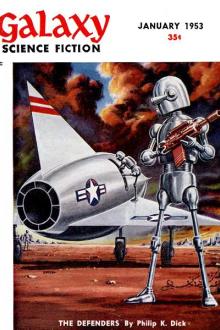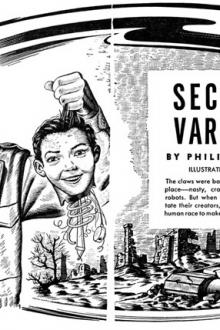Short Fiction by Philip K. Dick (popular books to read TXT) 📕

- Author: Philip K. Dick
Book online «Short Fiction by Philip K. Dick (popular books to read TXT) 📕». Author Philip K. Dick
Reinhart got quickly to his feet and left the office. He hurried down the hall and out of the Council building.
A few minutes later he was heading across the mid-morning sky in his highspeed cruiser, toward the Asiatic landmass, the vast Ural mountain range. Toward the Military Designs labs.
Sherikov met him at the entrance. “Look here, Reinhart. Don’t think you’re going to order me around. I’m not going to—”
“Take it easy.” Reinhart fell into step beside the bigger man. They passed through the check and into the auxiliary labs. “No immediate coercion will be exerted over you or your staff. You’re free to continue your work as you see fit—for the present. Let’s get this straight. My concern is to integrate your work with our total social needs. As long as your work is sufficiently productive—”
Reinhart stopped in his tracks.
“Pretty, isn’t he?” Sherikov said ironically.
“What the hell is it?”
“Icarus, we call him. Remember the Greek myth? The legend of Icarus. Icarus flew. … This Icarus is going to fly, one of these days.” Sherikov shrugged. “You can examine him, if you want. I suppose this is what you came here to see.”
Reinhart advanced slowly. “This is the weapon you’ve been working on?”
“How does he look?”
Rising up in the center of the chamber was a squat metal cylinder, a great ugly cone of dark gray. Technicians circled around it, wiring up the exposed relay banks. Reinhart caught a glimpse of endless tubes and filaments, a maze of wires and terminals and parts crisscrossing each other, layer on layer.
“What is it?” Reinhart perched on the edge of a workbench, leaning his big shoulders against the wall.
“An idea of Jamison Hedge—the same man who developed our instantaneous interstellar vidcasts forty years ago. He was trying to find a method of faster than light travel when he was killed, destroyed along with most of his work. After that F.T.L. research was abandoned. It looked as if there were no future in it.”
“Wasn’t it shown that nothing could travel faster than light?”
“The interstellar vidcasts do! No, Hedge developed a valid F.T.L. drive. He managed to propel an object at fifty times the speed of light. But as the object gained speed, its length began to diminish and its mass increased. This was in line with familiar twentieth-century concepts of mass–energy transformation. We conjectured that as Hedge’s object gained velocity it would continue to lose length and gain mass until its length became nil and its mass infinite. Nobody can imagine such an object.”
“Go on.”
“But what actually occurred is this. Hedge’s object continued to lose length and gain mass until it reached the theoretical limit of velocity, the speed of light. At that point the object, still gaining speed, simply ceased to exist. Having no length, it ceased to occupy space. It disappeared. However, the object had not been destroyed. It continued on its way, gaining momentum each moment, moving in an arc across the galaxy, away from the Sol system. Hedge’s object entered some other realm of being, beyond our powers of conception. The next phase of Hedge’s experiment consisted in a search for some way to slow the F.T.L. object down, back to a sub-F.T.L. speed, hence back into our universe. This counterprinciple was eventually worked out.”
“With what result?”
“The death of Hedge and destruction of most of his equipment. His experimental object, in re-entering the space-time universe, came into being in space already occupied by matter. Possessing an incredible mass, just below infinity level, Hedge’s object exploded in a titanic cataclysm. It was obvious that no space travel was possible with such a drive. Virtually all space contains some matter. To re-enter space would bring automatic destruction. Hedge had found his F.T.L. drive and his counterprinciple, but no one before this has been able to put them to any use.”
Reinhart walked over toward the great metal cylinder. Sherikov jumped down and followed him. “I don’t get it,” Reinhart said. “You said the principle is no good for space travel.”
“That’s right.”
“What’s this for, then? If the ship explodes as soon as it returns to our universe—”
“This is not a ship.” Sherikov grinned slyly. “Icarus is the first practical application of Hedge’s principles. Icarus is a bomb.”
“So this is our weapon,” Reinhart said. “A bomb. An immense bomb.”
“A bomb, moving at a velocity greater than light. A bomb which will not exist in our universe. The Centaurans won’t be able to detect or stop it. How could they? As soon as it passes the speed of light it will cease to exist—beyond all detection.”
“But—”
“Icarus will be launched outside the lab, on the surface. He will align himself with Proxima Centaurus, gaining speed rapidly. By the time he reaches his destination he will be traveling at F.T.L.-100. Icarus will be brought back to this universe within Centaurus itself. The explosion should destroy the star and wash away most of its planets—including their central hub-planet, Armun. There is no way they can halt Icarus, once he has been launched. No defense is possible. Nothing can stop him. It is a real fact.”
“When will he be ready?”
Sherikov’s eyes flickered. “Soon.”
“Exactly how soon?”
The big Pole hesitated. “As a matter of fact, there’s only one thing holding us back.”
Sherikov led Reinhart around to the other side of the lab. He pushed a lab guard out of the way.
“See this?” He tapped a round globe, open at one end, the size of a grapefruit. “This is holding us up.”
“What is it?”
“The central control turret. This thing brings Icarus back to sub-F.T.L. flight at the correct moment. It must be absolutely accurate. Icarus will be within the star only a matter of a microsecond. If the turret does not function exactly, Icarus will pass out the other side and shoot beyond the Centauran system.”
“How near completed is this turret?”
Sherikov hedged uncertainly, spreading out his big hands. “Who can say? It must be wired with infinitely minute equipment—microscope grapples and wires invisible to the naked eye.”
“Can





Comments (0)